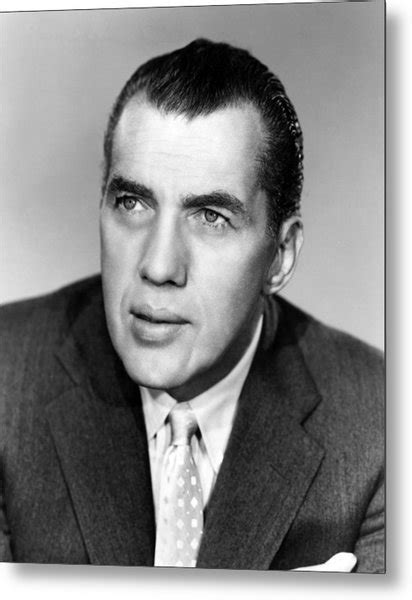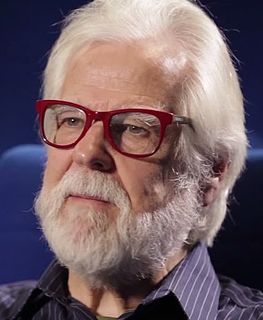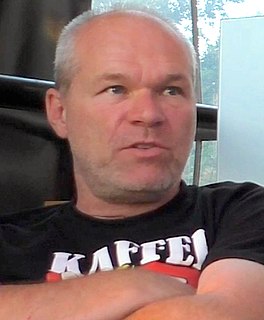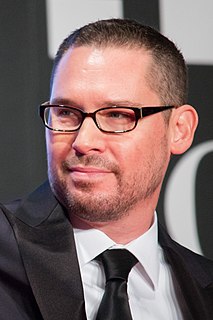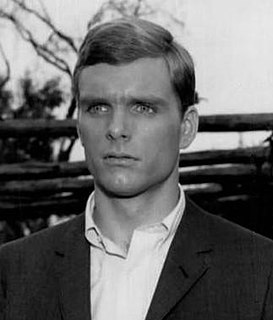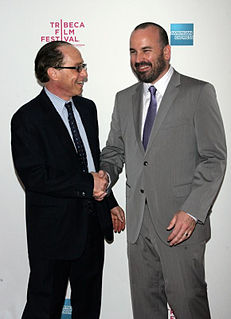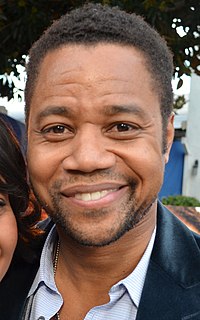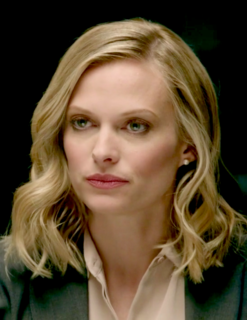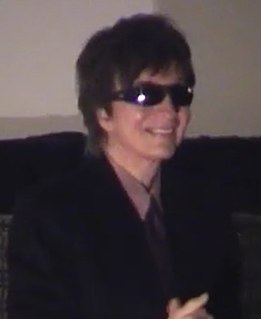Top 108 Kubrick Quotes & Sayings - Page 2
Explore popular Kubrick quotes.
Last updated on April 20, 2025.
I like filmmakers where, if their film comes on and you step in halfway through it, you can recognize that, hey, this is a Coen Brothers film. Or, hey, this is a Stanley Kubrick movie. You can recognize some filmmakers. Like, if you put on a Sam Raimi movie, you can tell that it's a Sam Raimi movie pretty quickly. I like a signature style that people can recognize and relate to, and connect with. I think that is part of why we seek out certain directors. We want to see how they view the world.
We thought it was only in science fiction that things created by humans could actually take over what is inherently our human heritage. But Thom Hartmann shows how we've already let that happen on a frightening scale - not in Frankenstein's monsters or Kubrick's creeping computer Hal - but in the corporations that present their friendly 'faces' to us as if we have nothing to fear from this ultimate usurpation of our rights as real humans.
It is amazing that 2001: A Space Odyssey has not aged at all, except for a few minor technical gadgets. The main reason is, of course, the philosophical or spiritual element in this story. We know as little today about the secrets of Creation and evolution as we knew before, and it is not likely that we'll ever know much more. We'll have to be satisfied, as Kubrick was, respectfully admiring the potential for evolution within the mystery of the universe's creation.
It's so hard to do anything that doesn't owe some kind of debt to what Stanley Kubrick did with music in movies. Inevitably, you're going to end up doing something that he's probably already done before. It always seem like we're falling behind whatever he came up with. "Singin' in the Rain" (1952) in "A Clockwork Orange" (1971) - that was the first time I became so aware of music in movies. So no matter how hard you try to do something new, you're always following behind.
When I was a kid and I was being introduced to science fiction by watching movies with my Dad, Kubrick is one of those guys that we used to watch, you know, I watched Clockwork Orange at an age that was incredibly inappropriate, but he sat there with me and he explained what was going on and you know, I came to appreciate it even if I was terrified at the time.
I think it's better to be too early and disturb a few people - but have other people say it was necessary - than to do it way after the fact. We shouldn't forget that Charlie Chaplin did a movie about Hitler while Hitler was alive, and Peter Sellers in Stanley Kubrick's masterpiece Dr. Strangelove was during the McCarthy time, where everybody was a communist and McCarthy was flipping completely out. I think it's important to have a movie like Postal now, where we are on the peak of the Iraq War, on the peak of terrorist attacks, where everything is actually happening.
[Kubrick] was unique in the sense that with each new film he redefined the medium and its possibilities. But he was more than just a technical innovator. Like all visionaries, he spoke the truth. And no matter how comfortable we think we are with the truth, it always comes as a profound shock when we're forced to meet it face-to-face.
I think one of the thing that makes a Kubrick film a great experience is the fact that he bends reality to his will and is so confident that he ends up creating something that is the island in the stream of pop culture and he takes a stand that's so firm and so confident and unyielding that it can't be ignored and I appreciate that.
Directors who have inspired me include Billy Wilder, Federico Fellini, lngmar Bergman, John Ford, Orson Welles, Werner Herzog, Stanley Kubrick, Alfred Hitchcock, Francis Ford Coppola and Ernst Lubitsch. In art school, I studied painters like Edward Hopper, who used urban motifs, Franz Kafka is my favorite novelist. My approach to film stems from my art background, as I go beyond the story to the sub-conscious mood created by sound and images.
We knew from the beginning the level of commitment needed. We felt honored to work with Stanley Kubrick. We were going to do what it took to do this picture, whatever time, because I felt - and Nic [Nicole Kidman] did, too - that this was going to be a really special time for us. We knew it would be difficult. But I would have absolutely kicked myself if I hadn`t done this.
The genius is not in how much Stanley Kubrick does in “2001: A Space Odyssey,'' but in how little. This is the work of an artist so sublimely confident that he doesn't include a single shot simply to keep our attention. He reduces each scene to its essence, and leaves it on screen long enough for us to contemplate it, to inhabit it in our imaginations. Alone among science-fiction movies, “2001'' is not concerned with thrilling us, but with inspiring our awe.
It's hard to see a film one time and really "get it," and write fully and intelligently about it. That's a review. That's not film criticism. And there's so many expectations involved, too. You're going in to see the latest Martin Scorsese or Stanley Kubrick film, you really have high hopes, and you can't help but find that it's not exactly what you had in your head going in. Until you can watch it again, you can't accept the work for what it intends to be. It takes at least a second viewing.
Young people today are flooded with disconnected images but lack a sympathetic instrument to analyze them as well as a historical frame of reference in which to situate them. I am reminded of an unnerving scene in Stanley Kubrick's epic film, 2001: A Space Odyssey, where an astronaut, his air hose cut by the master computer gone amok, spins helplessly off into space.
As filmmakers, we want the audience to have the most complete experience they can. For example, I interviewed Stanley Kubrick years ago around the time of '2001: A Space Odyssey.' I was going to see the film that night in London, and he insisted I sit in one of four seats in the theater for the best view or not watch the film.

